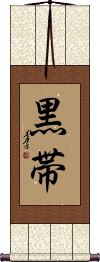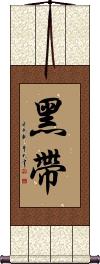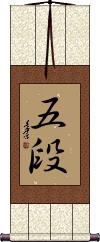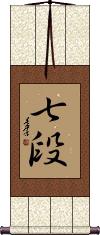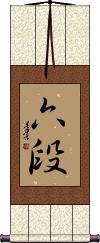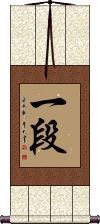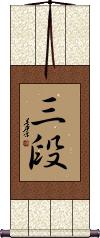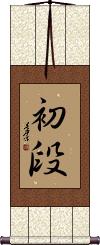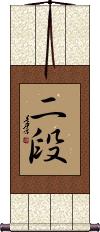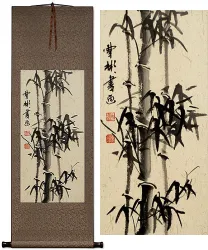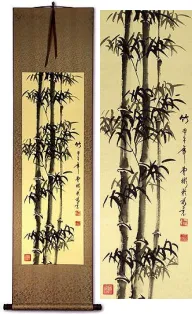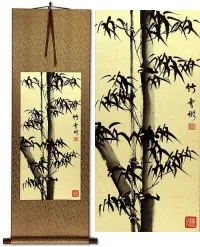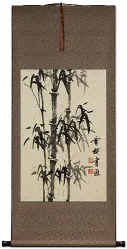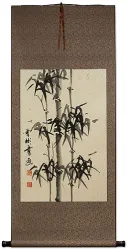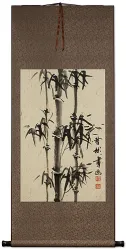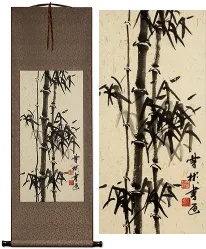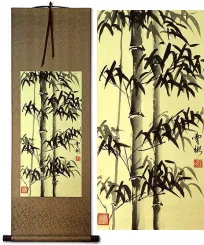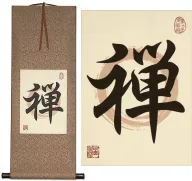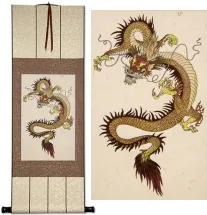Many custom options...
And formats...

Not what you want?
Try other similar-meaning words, fewer words, or just one word.
Black Belt in Chinese / Japanese...
Buy a Black Belt calligraphy wall scroll here!
Personalize your custom “Black Belt” project by clicking the button next to your favorite “Black Belt” title below...
1. Black Belt
2. Go-Dan / 5th Degree Black Belt
3. Nana-Dan / 7th Degree Black Belt
4. Roku-Dan / 6th Degree Black Belt
5. Shichi-Kyu
6. Rank Holder
8. San-Dan
9. Sho-Dan
10. Ni-Dan
11. Ku-Dan
Black Belt
These are the Kanji for “Black Belt” in Japanese.
This would be the gift to buy someone who is about to achieve the rank of black belt, or perhaps for yourself, like a certificate on the wall to subtly show your accomplishment.
It should be mentioned that the title “black belt” is not a typical selection for a calligraphy wall scroll.
Note: with a tiny stroke difference on the second character, this also means black belt in Korean Hanja. Let me know if you need the exact Korean version (though any Korean who can read Hanja will know this is black belt).
Black Belt
黑帶 is “black belt” in Chinese.
Many will argue whether rank systems that include a “black belt” are used in pure Chinese martial arts systems. The argument goes that it's more a Japanese idea merged into the western versions of Chinese martial arts. However, in Wushu (often referred to as Kung Fu), it's said that all students started with white belts. Over the years of training, the white belt would get dirty until finally appearing black with filth. Thus, more advanced students had darker belts.
If you want this title in Chinese, this would be the form.
![]() Often, the second character is written like the image to the right. If you like this version, click on this character instead of the button above.
Often, the second character is written like the image to the right. If you like this version, click on this character instead of the button above.
Go-Dan / 5th Degree Black Belt
Nana-Dan / 7th Degree Black Belt
Roku-Dan / 6th Degree Black Belt
六段 is the Japanese title for the 6th Degree or 6th Level.
This applies mostly to martial arts and earning the title of a 6th-degree black belt.
The first character is simply the number 6.
The second character is “dan” which is often translated as “degree” in the context of Japanese martial arts. 六段 means grade, rank, level. When a number is in front like this, it refers to a senior rank in martial arts or games of strategy such as go, shogi, chess, etc.
Shichi-Kyu
七級 or Shichi-Kyu/Shichikyu is the 7th Kyu or 7th Rank before black belt in many Japanese martial arts ranking schemes.
In some cases this is a yellow belt with two stripes, other schools designate this with a blue belt.
In Chinese, this can mean seven floors - like a seven-floor pagoda.
Rank Holder
The one who has achieved rank in martial arts
有段者 is a Japanese term for someone who holds rank in karate, judo, etc.
This term theoretically applies to anyone with rank (above a white belt). However, some schools or dojos may reserve this title for a holder of a black belt.
I'd suggest that you only order this phrase if you have honestly reached this level.
This title does kind of make sense in Chinese but only to those Chinese who practice “kong shou dao” (karate) or when used in the context of martial arts.
Ichi-Dan / First Degree
In Japanese martial arts, this usually represents the first-degree black belt rank.
It can also be like a linguistic stair step of “more, much more, still more, all the more.” It can also be a step, rung, level, or rank.
Also sometimes used in the context of Buddhism to mean “first step” or “first stage.” This might presume the first step towards enlightenment etc.
San-Dan
Sho-Dan
Ni-Dan
二段 is a Japanese Kanji word that literally means “second degree.”
二段 is the second black belt rank in Japanese martial arts.
The first Kanji means two or second in Japanese.
The second Kanji means step, grade, rank, or level.
二段 can also be written as 弐段. This version just uses a more complicated Kanji for the number two.
Ku-Dan
Martial Arts Master
武芸者 is the Japanese Kanji title for “Martial Arts Master.” It suggests that you have reached at least the level of black belt and are probably to the level where you are ready to become an instructor.
Please consider carefully where you stand before ordering this phrase on a wall scroll. If you are not a master, this will make you look a bit foolish.
If you want to get this as a gift for your master at the dojo. Try to discreetly make sure this term is used in your school. Different schools and styles of Japanese martial arts use different terms. You may notice in the Romaji that the last two characters romanize as “geisha” which means “person skilled in arts” (what a geisha girl really is). The title here has the character for “martial,” “warrior,” and/or “military” in front of it. Therefore the literal translation is “martial art person.”
These Kanji are valid Chinese characters and Korean Hanja, but this title does not really make sense in Chinese and is not often used in Korean, though a Chinese or Korean would be able to guess the meaning by looking at the first and last characters.
This in-stock artwork might be what you are looking for, and ships right away...
Gallery Price: $130.00
Your Price: $84.88
Gallery Price: $130.00
Your Price: $69.88
The following table may be helpful for those studying Chinese or Japanese...
| Title | Characters | Romaji (Romanized Japanese) | Various forms of Romanized Chinese | |
| Black Belt | 黒帯 黑帯 | kuroobi / kurobi | ||
| Black Belt | 黑帶 黑带 | hēi dài / hei1 dai4 / hei dai / heidai | hei tai / heitai | |
| Go-Dan 5th Degree Black Belt | 五段 | go dan / godan | ||
| Nana-Dan 7th Degree Black Belt | 七段 | nana dan / nanadan | ||
| Roku-Dan 6th Degree Black Belt | 六段 | roku dan / rokudan | ||
| Shichi-Kyu | 七級 七级 | shichi kyu / shichikyu | qī jí / qi1 ji2 / qi ji / qiji | ch`i chi / chichi / chi chi |
| Rank Holder | 有段者 | yuu dan sha yuudansha yu dan sha | yǒu duàn zhě you3 duan4 zhe3 you duan zhe youduanzhe | yu tuan che yutuanche |
| Ichi-Dan First Degree | 一段 | ichi dan / ichidan | yī duàn / yi1 duan4 / yi duan / yiduan | i tuan / ituan |
| San-Dan | 三段 | san dan / sandan | ||
| Sho-Dan | 初段 | sho dan / shodan | ||
| Ni-Dan | 二段 | ni dan / nidan | ||
| Ku-Dan | 九段 | ku dan / kudan | ||
| Martial Arts Master | 武芸者 | bugeisha | wǔ yún zhě wu3 yun2 zhe3 wu yun zhe wuyunzhe | wu yün che wuyünche |
| In some entries above you will see that characters have different versions above and below a line. In these cases, the characters above the line are Traditional Chinese, while the ones below are Simplified Chinese. | ||||
Successful Chinese Character and Japanese Kanji calligraphy searches within the last few hours...
